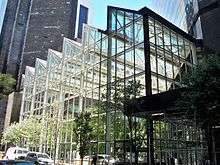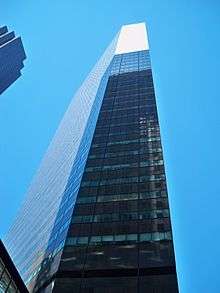590 Madison Avenue
| 590 Madison Avenue | |
|---|---|
 | |
| General information | |
| Status | Complete |
| Type | Office |
| Coordinates | 40°45′44″N 73°58′21″W / 40.76225°N 73.97237°WCoordinates: 40°45′44″N 73°58′21″W / 40.76225°N 73.97237°W |
| Construction started | 1979 |
| Completed | 1983[1] |
| Cost | $10 million |
| Owner | Odyssey |
| Height | |
| Roof | 603 ft (184 m) |
| Technical details | |
| Floor count | 41 |
| Floor area | 93,592 m2 (1,007,420 sq ft) |
| Lifts/elevators | 24 |
| Design and construction | |
| Architect | Edward Larrabee Barnes & Associates |
| Developer | IBM |
| Structural engineer | The Office of James Ruderman |
590 Madison Avenue also known as the IBM Building, is a 603 feet (184 m) tall skyscraper at the corner of East 57th Street and Madison Avenue in New York City, New York. It was completed in 1983 and has 41 floors.[2][3] The building cost US$10 million, has 93,592 square metres (1,007,420 sq ft) of floor area, has 24 elevators, and is the 89th tallest building in New York. Edward Larrabee Barnes & Associates designed the building,[4] and IBM developed it. IBM sold the tower to Odyssey in 1994. As of December 2007, 98% of the building is leased.
History
The world headquarters of IBM had been in a previous 20-story building on this site which opened in January 1938.[5] IBM moved its headquarters to Armonk, New York in 1964[6] but still needed a facility in New York City. In 1973, the construction of a new IBM building to replace the existing one was permitted by New York City. Its plan included square footage exceeded the legal limitation of allowable floor area but it was accepted because of the bonus for providing benefits of public open space. The original building was demolished starting in 1977.[5] The present building was completed in 1983. It contained public open space as part of a 1961 amendment to the 1916 Zoning Resolution, which allowed architects to create buildings with more square footage if they contained public open spaces.[7]
The building was used by IBM as its Eastern regional headquarters until it was sold to Odyssey in 1994. In following year, the new owner applied to the City Planning Commission for the modification proposal of its atrium. After hearing of arguments for and against the proposal, the public space was altered. Although there were some changes in the atrium such as the removal of a few bamboo trees, additional chairs, and displays of sculpture, it still kept the designation as an oasis in the city. The building and its atrium have been known as one of the most monumental buildings and popular open spaces in the city.[8]
Description
590 Madison Avenue is an office building designed by Edward Larrabee Barnes. It was originally owned by IBM and thus called the "IBM Building".[9] The tower was completed in 1983, and was used by numerous IBM branch offices until it was sold to Odyssey in 1994. The building is still named for IBM, and the global technology firm remains a major tenant. The 41-story building's height reaches 603 feet (184 m). It has a unique wedge shape and an adjacent, privately owned public space covered by a glass structure, which contains resting chairs, tables, and bamboo trees, and is used for pedestrian circulation, resting, amenities, art displays and cultural events.
Site

The building is located on the west side of Madison Avenue between 56th and 57th Streets. The Trump Tower, and the Sony Building, nearby, also have public spaces. This context strongly influenced the design of the building. Its wedge shape was intended to avoid too much volume of the building toward 56th Street, which is a relatively narrow street. Instead, Barnes faced the building toward 57th Street and Madison Avenue directly without setback. The space saved by cutting the South West corner of the building allowed the creation of open space at ground level. The open space is connected to 5th Avenue through the atrium in the Trump Tower. Also, a pedestrian arcade is across the block and creates circulation from 57th Street through 56th Street to the Sony Building. The open space of the IBM building not only provides the space to escape from density but also activates the circulation in this area.[10]
Form and use
The building was designed as a unique wedge shape, having the South West corner cut from the rectangular box. The volume can be seen differently from different angles, sometimes slender, sometimes gigantic. The entrance of the building provides spectacle and openness to the street and welcoming visitors. Of the building's 41 stories, most are assigned to office use. At ground level, some retail stores face 57th Street. The building occupies only 40 percent of the property and the rest of the square footage is assigned to public open space. The space is filled with a series of amenities such as food and drink kiosks, tables and chairs, receptacles, etc. Green bamboo trees installed in the space celebrate the serenity of an indoor garden. Also, artwork is displayed inside to entertain visitors. This space is occasionally used for special events.[11][7]

Material and structure
The exterior of the building is covered by gray green glass and polished granite. The moderately reflective surface keeps changing its texture depending on the angle and the light. The use of transparent glass for the public space emphasizes its openness and lets plenty of sunlight in. The wedge shaped building was a challenge in terms of structure because its shape caused more wind load than that to conventional box shaped skyscrapers. After wind tunnel tests, the original structural design was revised because of the wind load. The frames around the elevator shafts remained as they were, with diagonal frames added. Columns on the perimeter of the building were moved closer by half and the spandrel beams were strengthened. Surprisingly, after redesign of the structure, the total amount of steel required decreased. Another interesting challenge in the structure's design was the cantilevered entrance. The challenge was not how to support the load above, but how to keep the stability of the building. Using stronger and bigger columns for the base solved this problem.[10]
Notable tenants
- IBM is the largest tenant, housing a significant portion of its New York City based workforce on multiple floors of the building.
- Lovells
- Bonhams
- Russell Investments
- Travelzoo
- Galleon Group
- Brevan Howard
- Bain Capital
- Pine River Capital Management
- Morgan Stanley
- Citigroup
- Bank of America
- UBS
- Cemex
- Crowell & Moring
- Regus
- Leeds Equity Partners
- NASCAR Whelen Modified and marketing offices
See also
References
- ↑ "590 Madison Avenue Atrium". The Cultural Landscape Foundation. Retrieved 23 April 2013.
- ↑ "590 Madison Avenue". Emporis. Retrieved 2009-12-20.
- ↑ "590 Madison Avenue". SkyscraperPage.com. Archived from the original on 2007-11-24. Retrieved 2009-12-20.
- ↑ "590 Madison Avenue Information". New York City Department of City Planning. Retrieved 23 April 2013.
- 1 2 "IBM Archives: World Headquarters, N.Y. City". IBM Archives. Retrieved April 24, 2012.
- ↑ Fuchs, Marek; County Lines: Onward in Armonk, New York Times, February 24, 2002
- 1 2 Larrabee Barnes, Edward (1994). Edward Larrabee Barnes, Architect. Rizzoli International Publications. pp. 158–165. ISBN 9780847818228. OCLC 860607981.
- ↑ Wiley, John (2000). Privately Owned Public Space. The New York City Department of City Planning, The Municipal Society Art of New York. pp. 173–174.
- ↑ "590 Madison Avenue - IBM Bldg". Showcase. Retrieved 13 March 2013.
- 1 2 Architectural Record. 172 (6): 149. May 1984.
- ↑ W. Bressi, Todd (1993). Planning and Zoning New York City. Rutgers, the State University of New Jersey. pp. 173–4.